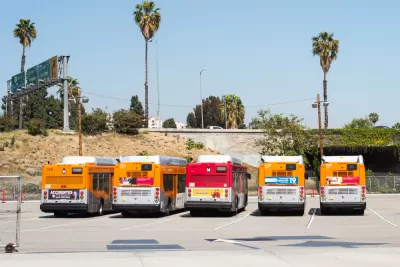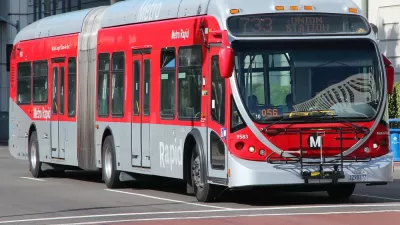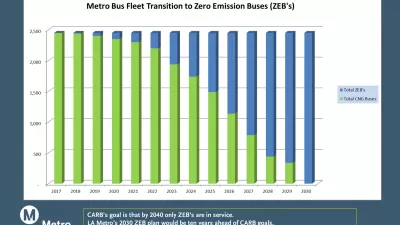At a June 22 meeting, the Los Angeles County Metropolitan Transportation Authority board ordered 295 buses that will be fueled with renewable natural gas. An expected purchase of 35 electric buses was delayed until next month's meeting.

"The Los Angeles County Metropolitan Transportation Authority (Metro) has voted to purchase 295 40-foot compressed natural gas buses, which will be fueled by renewable natural gas (RNG), according to the latest release from NGVAmerica," reports Lauren Tyler for NGT News. "The contract also includes an option for the purchase of 305 additional 40-foot CNG buses."
As noted in an earlier post, "Los Angeles Metro to Go Fully Electric by 2030," the board was also asked "to approve the purchase of 35 60-foot electric buses for the Orange Line — the goal remains to convert the Orange Line to fully electric buses by 2020 while also putting electric buses on the Silver Line."
According to an email from an electric bus advocate, that part of the bus procurement was held over due to concerns about the contract with Canada-based New Flyer.
Metro's bus fleet, second largest after New York's, is among the nation's cleanest, having converted from diesel fuel to cleaner-burning natural gas by 2011, fulfilling a 1993 commitment to clean air in the nation's smoggiest city.
However, new technology has significantly reduced emissions from older CNG engines, so "LA Metro will also begin retrofitting and replacing its buses with the new Cummins-Westport Low NOx CNG engines [aka "near-zero emissions"] that reduce smog-forming NOx and GHG emissions that are 90% lower than the U.S. Environmental Protection Agency NOx limit," according to the NGV (Natural Gas Vehicles for America) release. See Metro's October 2016 announcement on these near-zero emissions engine replacements.
“This engine gives our customers the most affordable path to zero-equivalent emissions and the benefits of performance and reliability described by California’s South Coast Air Quality Management District as equivalent to an electric vehicle,” said Rob Neitzke, president of Cummins Westport.
As noted in an April post, "Best Fuel to Power Buses: Renewable Natural Gas or Battery-Electric?" the use of renewable natural gas, derived from the decomposition of organic matter from sources such as landfills, anaerobic digesters and waste treatment plants, offers transit agencies an additional route toward zero emissions than relying solely on electric and fuel cell buses. [See compelling editorial that advocates for Metro using both alternatives, which appears to be the case.]
FULL STORY: LA Metro Approves Massive Order for 295 Renewable CNG Buses

Trump Administration Could Effectively End Housing Voucher Program
Federal officials are eyeing major cuts to the Section 8 program that helps millions of low-income households pay rent.

Planetizen Federal Action Tracker
A weekly monitor of how Trump’s orders and actions are impacting planners and planning in America.

The 120 Year Old Tiny Home Villages That Sheltered San Francisco’s Earthquake Refugees
More than a century ago, San Francisco mobilized to house thousands of residents displaced by the 1906 earthquake. Could their strategy offer a model for the present?

HSR Reaches Key Settlement in Northern California City
The state’s high-speed rail authority reached an agreement with Millbrae, a key city on the train’s proposed route to San Francisco.

Washington State Legislature Passes Parking Reform Bill
A bill that would limit parking requirements for new developments is headed to the governor’s desk.

Missouri Law Would Ban Protections for Housing Voucher Users
A state law seeks to overturn source-of-income discrimination bans passed by several Missouri cities.
Urban Design for Planners 1: Software Tools
This six-course series explores essential urban design concepts using open source software and equips planners with the tools they need to participate fully in the urban design process.
Planning for Universal Design
Learn the tools for implementing Universal Design in planning regulations.
Ada County Highway District
Clanton & Associates, Inc.
Jessamine County Fiscal Court
Institute for Housing and Urban Development Studies (IHS)
City of Grandview
Harvard GSD Executive Education
Toledo-Lucas County Plan Commissions
Salt Lake City
NYU Wagner Graduate School of Public Service




























